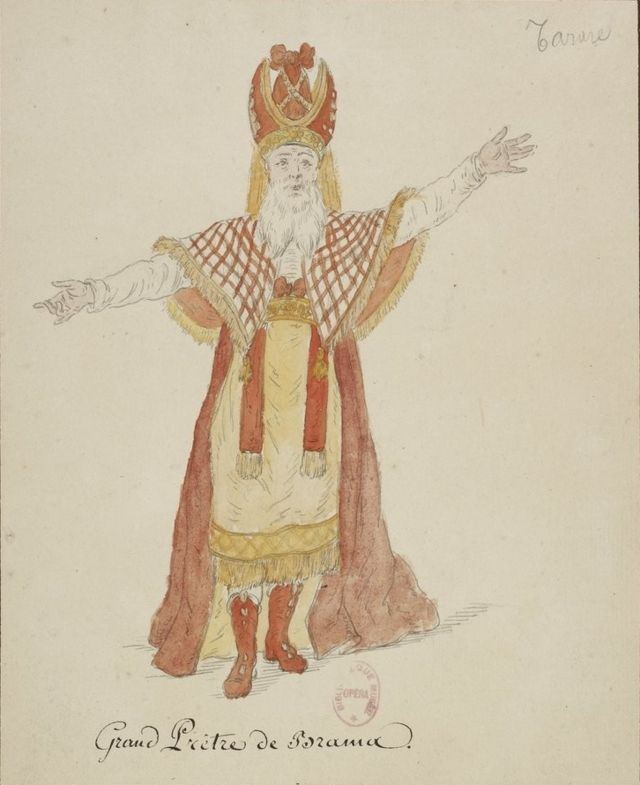Tarare (opera)
Opera by Antonio Salieri From Wikipedia, the free encyclopedia
Tarare is an opéra (tragédie lyrique) composed by Antonio Salieri to a French libretto by Pierre Beaumarchais. It was first performed by the Paris Opera at the Théâtre de la Porte Saint-Martin on 8 June 1787.[1] Salieri also reworked the material into an Italian version retitled Axur, re d'Ormus with libretto by Lorenzo Da Ponte, which opened in Vienna in January 1788.
| Tarare | |
|---|---|
| Tragédie lyrique by Antonio Salieri | |
 Adolphe Nourrit in the title role, in Paris 1823 | |
| Librettist | Pierre Beaumarchais |
| Language | French |
| Premiere | |

Roles
| Roles | Voice type[2] | Premiere, 8 June 1787[3] Conductor: Jean-Baptiste Rey |
|---|---|---|
| The genius that presides over the reproduction of creatures, or Nature | soprano | Suzanne Joinville |
| The genius of fire, which presides over Sun, in love with Nature | basse-taille (bass-baritone) | Louis-Claude-Armand Chardin (stage name, "Chardini") |
| Atar,[4] King of Ormus, a wild and unrestrained man | basse-taille (bass-baritone) | Auguste-Athanase (Augustin) Chéron |
| Tarare,[4] a soldier in his service, honoured for his great virtues | taille (baritenor) | Étienne Lainez |
| Astasie,[4] Tarare's wife, both tender and pious | soprano | Marie Thérèse Maillard |
| Arthénée,[4] High Priest of Brahma, a misbeliever devoured by pride and ambition | basse-taille (bass-baritone) | Martin-Joseph Adrien |
| Altamort,[4] an army general, son of the High Priest, a reckless and fiery youth | basse-taille (bass-baritone) | M Châteaufort |
| Urson, captain of Atar's guard, a valiant man of great honor | basse-taille (bass-baritone) | M Moreau |
| Calpigi,[4] chief of the Eunuchs, a European slave and a former singer emerged from the Chapels of Italy, being sensitive and gay | haute-contre | Jean-Joseph Rousseau[5] |
| Spinette,[4] a European slave woman, Calpigi's wife and a former Neapolitan cantatrice, being meddlesome and coquettish | soprano | Adélaïde Gavaudan, "cadette" |
| Elamir, a boy of the Augurs, being naive and very devout | boy soprano | Joseph-François-Narcisse Carbonel[6] |
| A priest of Brahma | basse-taille (bass-baritone) | Pierre-Charles Le Roux "cadet" (the younger)[7] |
| A slave | basse-taille (bass-baritone) | Pierre-Charles Le Roux "cadet" (the younger) |
| A eunuch | basse-taille (bass-baritone) | Pierre-Charles Le Roux "cadet" (the younger) |
| A shepherdess/A shadow (prologue) | soprano | Anne-Marie-Jeanne Gavaudan "l'aînée" |
| A peasant | basse-taille (bass-baritone) | M Dessaules |
Discography
Cyrile Dubois, Tarare and ombre de Tarare, Karine Deshayes, Astasie and ombre de Astasie, Jean-Sébastien Bou, Atar and ombre d'Atar, Judith van Wanroij, La Nature and Spinette, Les Chantres du Centre de Musique Baroque de Versailles, Les Talens Lyriques, conducted by Christophe Rousset. Aparté 2019.
References
External links
Wikiwand - on
Seamless Wikipedia browsing. On steroids.
